2023年中考英语总复习课件一轮知识梳理 第01课时 Units 1—4(冀教版七上)
文档属性
| 名称 | 2023年中考英语总复习课件一轮知识梳理 第01课时 Units 1—4(冀教版七上) | 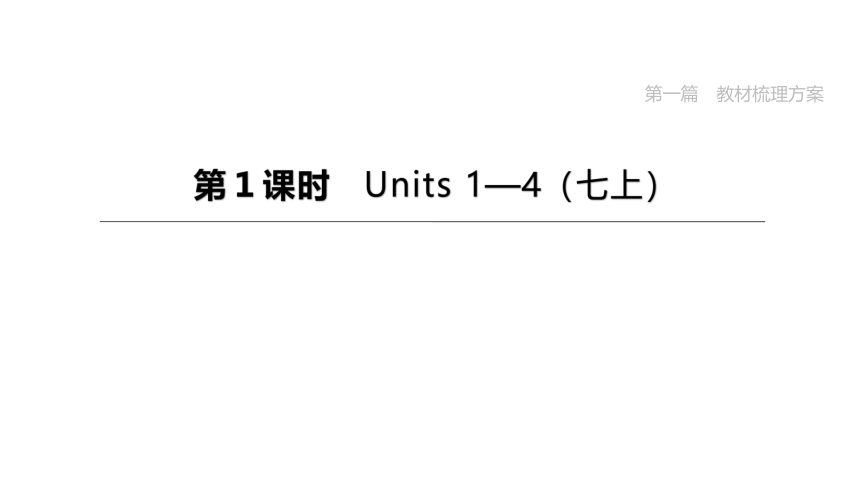 | |
| 格式 | pptx | ||
| 文件大小 | 460.4KB | ||
| 资源类型 | 教案 | ||
| 版本资源 | 冀教版 | ||
| 科目 | 英语 | ||
| 更新时间 | 2023-03-06 21:41:33 | ||
图片预览

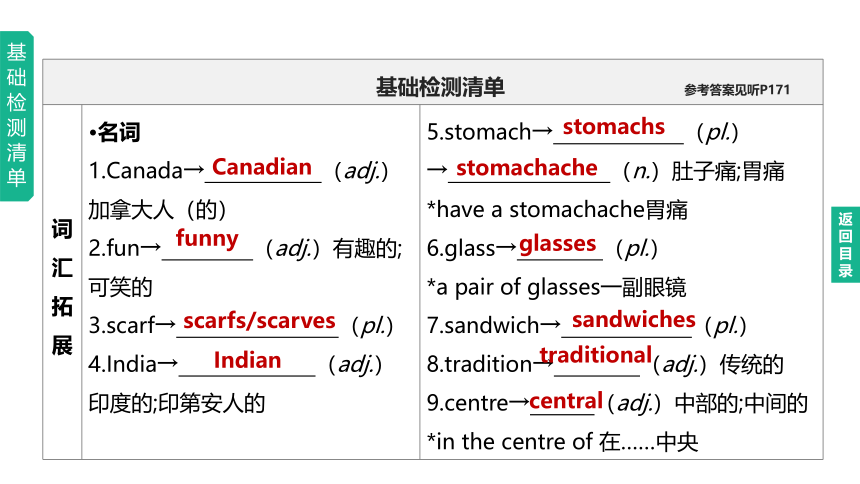
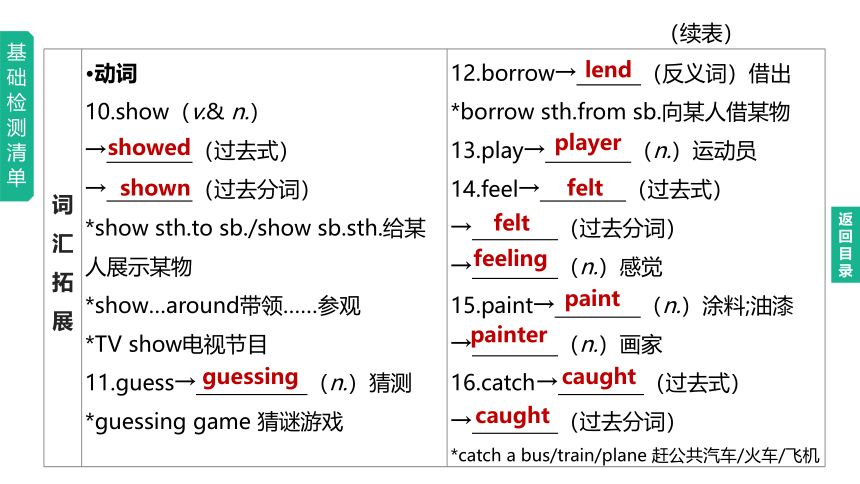
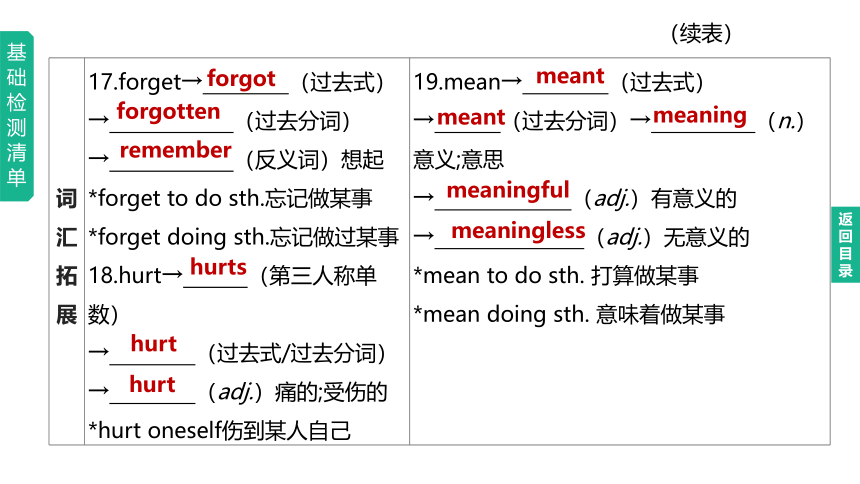
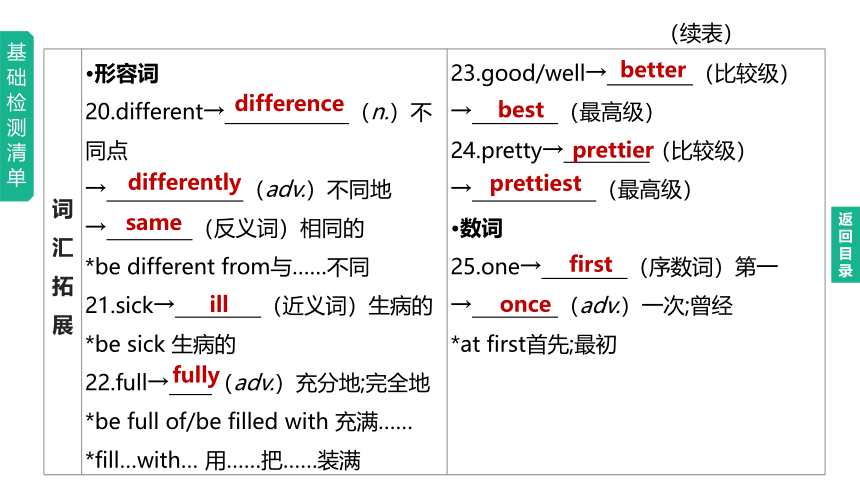
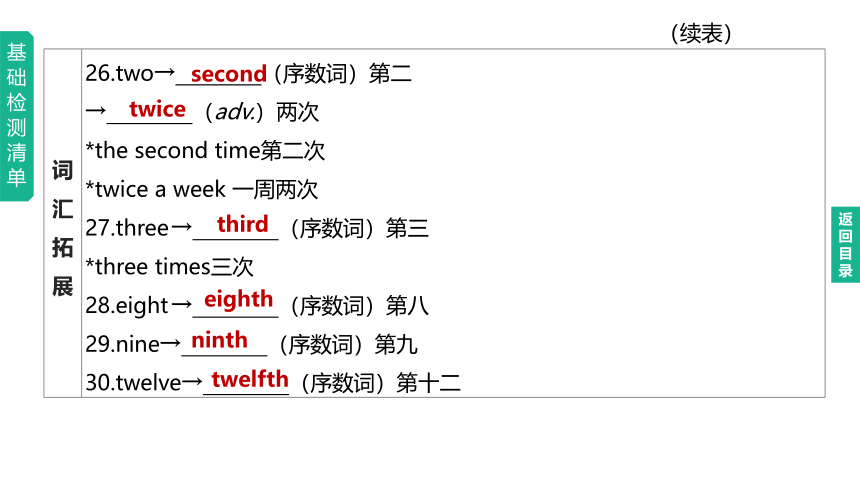
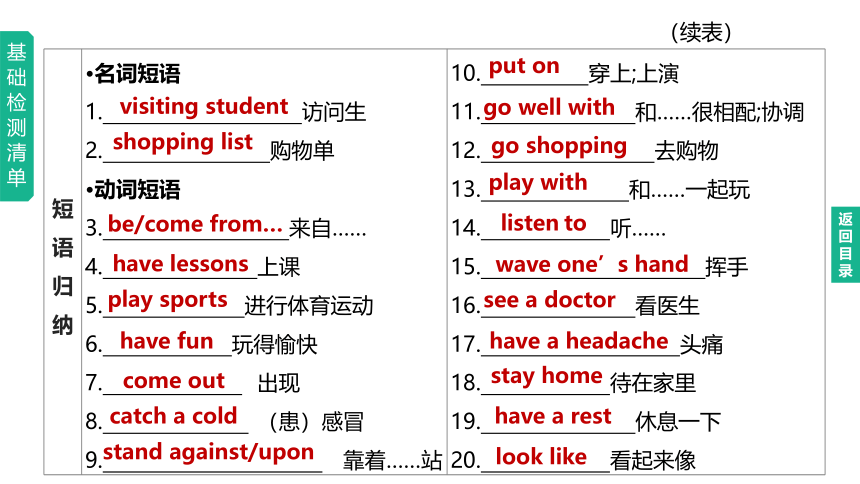
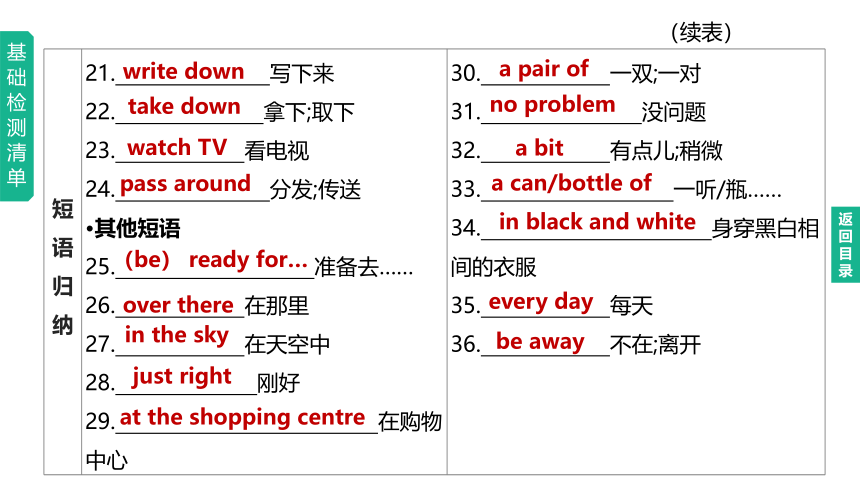
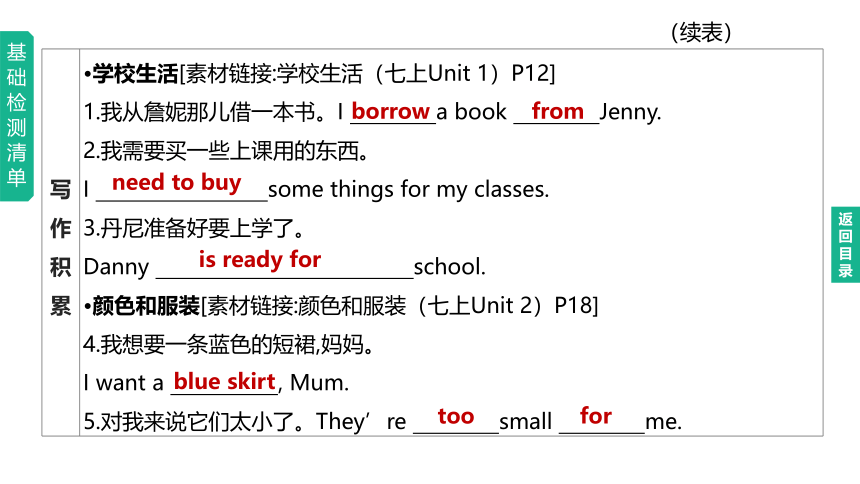
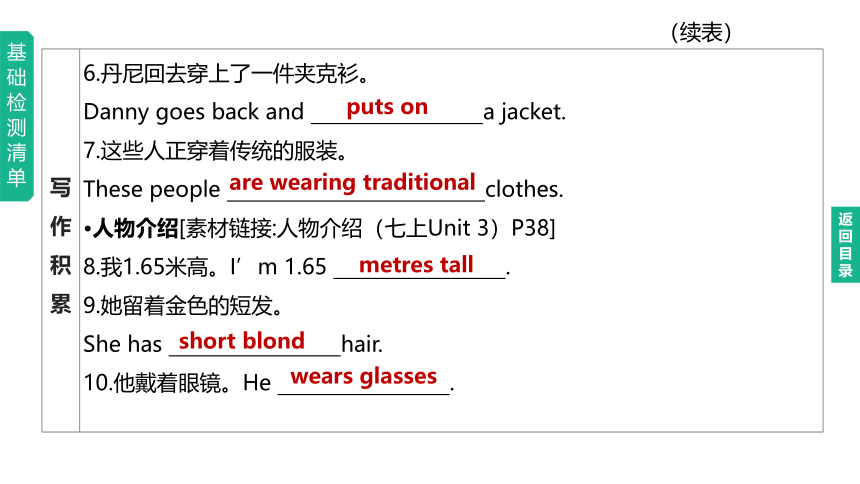
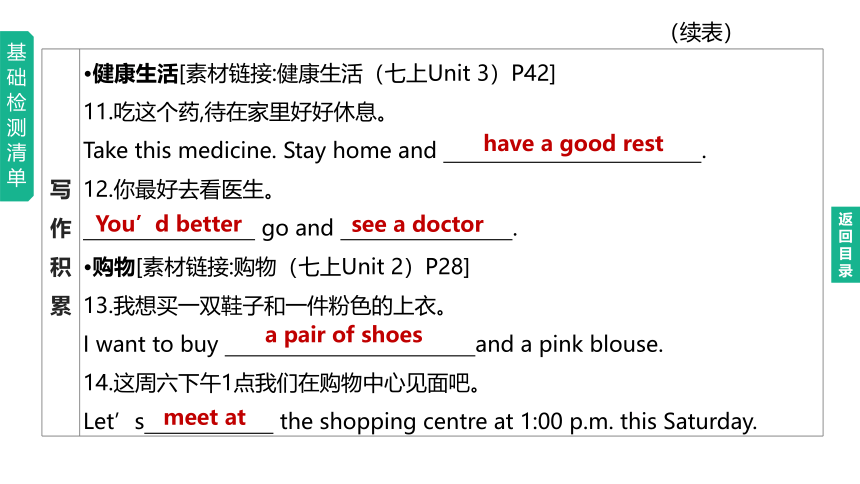
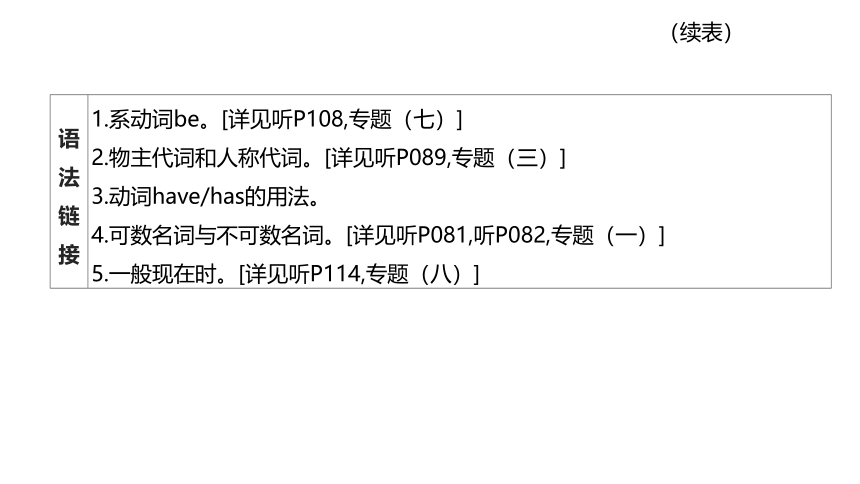
文档简介
(共39张PPT)
第一篇 教材梳理方案
第1课时 Units 1—4(七上)
●基础检测清单
●重难考点过关
基础检测清单
基础检测清单 参考答案见听P171 词汇拓展 ·名词 1.Canada→ (adj.)加拿大人(的) 2.fun→ (adj.)有趣的;可笑的 3.scarf→ (pl.) 4.India→ (adj.)印度的;印第安人的 5.stomach→ (pl.)
→ (n.)肚子痛;胃痛
*have a stomachache胃痛
6.glass→ (pl.)
*a pair of glasses一副眼镜
7.sandwich→ (pl.)
8.tradition→ (adj.)传统的
9.centre→ (adj.)中部的;中间的
*in the centre of 在……中央
Canadian
funny
scarfs/scarves
Indian
sandwiches
stomachache
stomachs
glasses
traditional
central
词 汇 拓 展 ·动词 10.show(v.& n.) → (过去式) → (过去分词) *show sth.to sb./show sb.sth.给某人展示某物 *show…around带领……参观 *TV show电视节目 11.guess→ (n.)猜测 *guessing game 猜谜游戏 12.borrow→ (反义词)借出
*borrow sth.from sb.向某人借某物
13.play→ (n.)运动员
14.feel→ (过去式)
→ (过去分词)
→ (n.)感觉
15.paint→ (n.)涂料;油漆
→ (n.)画家
16.catch → (过去式)
→ (过去分词)
*catch a bus/train/plane 赶公共汽车/火车/飞机
基础检测清单
(续表)
showed
shown
guessing
paint
lend
felt
player
felt
feeling
painter
caught
caught
词 汇 拓 展 17.forget→ (过去式) → (过去分词) → (反义词)想起 *forget to do sth.忘记做某事 *forget doing sth.忘记做过某事 18.hurt→ (第三人称单数) → (过去式/过去分词) → (adj.)痛的;受伤的 *hurt oneself伤到某人自己 19.mean→ (过去式)
→ (过去分词)→ (n.)意义;意思
→ (adj.)有意义的
→ (adj.)无意义的
*mean to do sth. 打算做某事
*mean doing sth. 意味着做某事
基础检测清单
(续表)
forgot
forgotten
hurts
hurt
meant
meaningful
meant
meaning
meaningless
remember
hurt
基础检测清单
词 汇 拓 展 ·形容词 20.different→ (n.)不同点 → (adv.)不同地 → (反义词)相同的 *be different from与……不同 21.sick→ (近义词)生病的 *be sick 生病的 22.full→ (adv.)充分地;完全地 *be full of/be filled with 充满…… *fill…with… 用……把……装满 23.good/well→ (比较级)
→ (最高级)
24.pretty→ (比较级)
→ (最高级)
·数词
25.one→ (序数词)第一
→ (adv.)一次;曾经
*at first首先;最初
(续表)
ill
better
prettier
prettiest
first
once
fully
best
difference
differently
same
基础检测清单
词 汇 拓 展 26.two→ (序数词)第二
→ (adv.)两次
*the second time第二次
*twice a week 一周两次
27.three → (序数词)第三
*three times三次
28.eight → (序数词)第八
29.nine→ (序数词)第九
30.twelve→ (序数词)第十二
(续表)
twelfth
ninth
second
twice
third
eighth
基础检测清单
短语归纳 ·名词短语 1. 访问生 2. 购物单 ·动词短语 3. 来自…… 4. 上课 5. 进行体育运动 6. 玩得愉快 7. 出现 8. (患)感冒 9. 靠着……站 10. 穿上;上演
11. 和……很相配;协调
12. 去购物
13. 和……一起玩
14. 听……
15. 挥手
16. 看医生
17. 头痛
18. 待在家里
19. 休息一下
20. 看起来像
(续表)
play sports
listen to
shopping list
stay home
be/come from…
have lessons
have fun
come out
catch a cold
stand against/upon
put on
go well with
play with
visiting student
wave one’s hand
see a doctor
have a headache
look like
have a rest
go shopping
基础检测清单
短语归纳 21. 写下来 22. 拿下;取下 23. 看电视 24. 分发;传送 ·其他短语 25. 准备去…… 26. 在那里 27. 在天空中 28. 刚好 29. 在购物中心 30. 一双;一对
31. 没问题
32. 有点儿;稍微
33. 一听/瓶……
34. 身穿黑白相间的衣服
35. 每天
36. 不在;离开
(续表)
over there
write down
pass around
watch TV
in the sky
just right
at the shopping centre
a pair of
no problem
a bit
a can/bottle of
take down
in black and white
be away
every day
(be) ready for…
基础检测清单
写作积累 ·学校生活[素材链接:学校生活(七上Unit 1)P12]
1.我从詹妮那儿借一本书。I a book Jenny.
2.我需要买一些上课用的东西。
I some things for my classes.
3.丹尼准备好要上学了。
Danny school.
·颜色和服装[素材链接:颜色和服装(七上Unit 2)P18]
4.我想要一条蓝色的短裙,妈妈。
I want a , Mum.
5.对我来说它们太小了。They’re small me.
(续表)
borrow
from
need to buy
too
is ready for
blue skirt
for
基础检测清单
写作积累 6.丹尼回去穿上了一件夹克衫。
Danny goes back and a jacket.
7.这些人正穿着传统的服装。
These people clothes.
·人物介绍[素材链接:人物介绍(七上Unit 3)P38]
8.我1.65米高。I’m 1.65 .
9.她留着金色的短发。
She has hair.
10.他戴着眼镜。He .
(续表)
puts on
are wearing traditional
metres tall
short blond
wears glasses
基础检测清单
写作积累 ·健康生活[素材链接:健康生活(七上Unit 3)P42]
11.吃这个药,待在家里好好休息。
Take this medicine. Stay home and .
12.你最好去看医生。
go and .
·购物[素材链接:购物(七上Unit 2)P28]
13.我想买一双鞋子和一件粉色的上衣。
I want to buy and a pink blouse.
14.这周六下午1点我们在购物中心见面吧。
Let’s the shopping centre at 1:00 p.m. this Saturday.
(续表)
You’d better
have a good rest
see a doctor
a pair of shoes
meet at
语法链接 1.系动词be。[详见听P108,专题(七)]
2.物主代词和人称代词。[详见听P089,专题(三)]
3.动词have/has的用法。
4.可数名词与不可数名词。[详见听P081,听P082,专题(一)]
5.一般现在时。[详见听P114,专题(八)]
(续表)
(1)Peter will you the building and you can meet everyone.
A.lend; to B.compare; with
C.show; around D.show; up
重难考点过关
1
show v.指示;带路(2019.73)
C
(2)—Jack is telling everyone he has bought a new car.
—Pay no attention to him. He is just .
A.showing around B.showing off
C.showing up D.setting off
(3)showed, a, of, Lynn, photo, Canada, me
.
重难考点过关
Lynn showed me a photo of Canada
B
【归纳拓展】
重难考点过关
(1)Bob is too busy and he can’t help us the party.
A.to organizing B.organized
C.organizing D.organize
(2) the help of the local firemen, we learned some fire safety skills.
(3)The movie Hi, Mom is really moving. I couldn’t help (cry) when I watched it.
重难考点过关
2
help v.& n.帮助(2017.84)
D
With
crying
(4)It can help us know what is happening in the world.(英译汉)
.
重难考点过关
它能够帮助我们了解世界上正在发生什么。
【归纳拓展】
重难考点过关
(1)—I’m sorry I my exercise book at home this morning.
—It doesn’t matter. Don’t forget it here this afternoon.
A.left; to take B.forgot; bringing
C.left; to bring D.forgot; to bring
重难考点过关
3
forget v.忘记(2020.7)
C
(2)—Mr.Wang, I have trouble the text.
—Remember it three times before you begin to understand it.
A.to understand; reading
B.understanding; reading
C.understanding; to read
D.to understand; to read
重难考点过关
C
(3)—Do you still remember this group of friends in 2019
—Yes. But I forget where I them.
A.seeing; meet B.to see; met
C.seeing; met D.seeing; meeting
重难考点过关
C
【归纳拓展】
(1)forget 为及物动词,意为“忘记”。forget常用于两种结构:forget to do sth.与forget doing sth.。
重难考点过关
(2)forget的反义词为remember,其用法与forget相似:
remember to do sth.记得去做某事
remember doing sth. 记得做过某事
(3)表示“把某物落在某处”,用“leave sth.+地点”,不用forget。
I left my key in my room, so I can’t get in now.
我把钥匙落在房间里了,所以现在我进不去。
重难考点过关
(1)It was for us to solve the math problem. Few of us could even understand it.
A.difficult enough B.enough easy
C.easy enough D.enough difficult
(2)—We shouldn’t worry about Mary.
—You are right. She is to look after .
A.old enough; herself B.young enough; herself
C.enough old; her D.enough young; her
重难考点过关
4
enough adj.& adv.足够的(地)
A
A
(3)Ricky is so rich that he can buy for his parents.
A. present enough B. enough presents
C. some present D. much presents
重难考点过关
B
【归纳拓展】
【注意】 enough to do 有时可以和too…to…或so…that…互换。
Don’t worry. Linda can look after your pet carefully enough.
别担心。琳达会相当细心地照顾你的宠物。
重难考点过关
(1)—How can Julie say bad words about me I thought we were good friends.
—Who told you that Friends trust.
A.like B.tell
C.need D.make
重难考点过关
5
need v.& n.需要
C
(2)— we buy tickets before we visit the exhibition
—No, we pay for the exhibition. It’s free.
A.Might; mustn’t
B.May; can’t
C.Can; might not
D.Must; don’t need to
重难考点过关
D
重难考点过关
词性
用法
实义动词 有人称和数的变化, 常用结构:
(1)sb.+need(s)+sth. 某人需要某物
(2)sb.+need(s) to do sth. 某人需要做某事
(3)sth.+need(s) doing=sth.+need(s) to be done 某事需要被做
情态动词 无人称、时态和数的变化, 常见用法:
(1)通常用于否定句或疑问句中
(2)后接动词原形
(3)needn’t作为Must… 句式的否定回答, 相当于don’t/doesn’t have to
【归纳拓展】
(1)Hurry up, kids! The school bus is coming. We
have time left.
A.few B.little C.a little D.a few
(2)Nowadays, it’s convenient to pay by scanning the code instead of paying in cash. That is the reason
why young people carry paper money in the city.
A.many B.little C.much D.few
重难考点过关
6
a little/little/a few/few
B
D
(3)Though she talks little, she has made friends here.
A.little B.few
C.a few D.a little
(4)I have only money left. I can only afford an ice cream.
A. a few B. a little
C. few D. little
重难考点过关
C
B
重难考点过关
【词义辨析】
肯定意义 否定意义
用法
a few 一些,几个 few 几乎没有
few, a few指代或修饰可数名词复数
a little 一点儿 little 几乎没有
little, a little指代或修饰不可数名词
重难考点过关
Luckily, there is a little bread in the fridge.
幸运的是,冰箱里还有点面包。
If you don’t work hard for most of the year and then work hard for only a few days before the exam, you will probably fail.
如果你一年中大部分时间不努力学习,然后考试前几天才努力学习,你可能将不及格。
Judy did very well in the maths test. She made few mistakes in it.朱迪数学考得很好,她几乎没出什么错。
7
You’d better go and see a doctor, Wang Mei.
王梅,你最好去看医生。
(1)Time is limited! You’d better your time any more.
A.not to waste B.waste C.not waste D.wasting
(2)You’d better twice before you make an important decision.
A.think B.to think C.thinking D.thought
重难考点过关
C
A
【归纳拓展】
(1)You’d better…意为“你最好……”,是表示对别人的劝告、建议或一种愿望的常用句型。
You’d better not go out.It’s so dark outside.
你最好别出去,外面很黑。
(2)You’d better 中的You’d是You had的缩写, had better没有人称、数和时态的变化, 且其后必须跟动词原形。
(3)其否定形式是had better not…,表示“最好不要……”。
重难考点过关
8
What would you like /Would you like something to
drink 你想要点儿什么 /你想要些喝的吗
(1)—Susan, would you like another cake
— . I’m full.
A.Yes, please B.My pleasure
C.No, thanks D.Not at all
重难考点过关
C
(2)—Would you like to watch Detective Chinatown 3 with me tomorrow
— .I’ll be free then.
A.Sorry, I can B.Sure, I’d love to
C.What a pity D.Not at all
(3)you, what, like, to drink, would
重难考点过关
B
What would you like to drink
【归纳拓展】
would like的常见用法:
(1)“would like+名词或代词”意为“想要……”。
He would like some soup. 他想喝点儿汤。
(2)“would like+to do sth.”意为 “想要做某事”。
Would you like to have a rest 你想休息一下吗
(3)“would like+sb.+to do sth.”意为“想让某人做某事”。
I would like you to have supper with us.
我想让你和我们一起吃晚饭。
重难考点过关
(4)Would you like sth. 你想要某物吗
肯定答语:Yes, please. 否定答语:No, thanks.
(5)Would you like to do sth. 你想要做某事吗
肯定答语:Yes, I’d like/love to.
否定答语:I’d like/love to, but…
重难考点过关
第一篇 教材梳理方案
第1课时 Units 1—4(七上)
●基础检测清单
●重难考点过关
基础检测清单
基础检测清单 参考答案见听P171 词汇拓展 ·名词 1.Canada→ (adj.)加拿大人(的) 2.fun→ (adj.)有趣的;可笑的 3.scarf→ (pl.) 4.India→ (adj.)印度的;印第安人的 5.stomach→ (pl.)
→ (n.)肚子痛;胃痛
*have a stomachache胃痛
6.glass→ (pl.)
*a pair of glasses一副眼镜
7.sandwich→ (pl.)
8.tradition→ (adj.)传统的
9.centre→ (adj.)中部的;中间的
*in the centre of 在……中央
Canadian
funny
scarfs/scarves
Indian
sandwiches
stomachache
stomachs
glasses
traditional
central
词 汇 拓 展 ·动词 10.show(v.& n.) → (过去式) → (过去分词) *show sth.to sb./show sb.sth.给某人展示某物 *show…around带领……参观 *TV show电视节目 11.guess→ (n.)猜测 *guessing game 猜谜游戏 12.borrow→ (反义词)借出
*borrow sth.from sb.向某人借某物
13.play→ (n.)运动员
14.feel→ (过去式)
→ (过去分词)
→ (n.)感觉
15.paint→ (n.)涂料;油漆
→ (n.)画家
16.catch → (过去式)
→ (过去分词)
*catch a bus/train/plane 赶公共汽车/火车/飞机
基础检测清单
(续表)
showed
shown
guessing
paint
lend
felt
player
felt
feeling
painter
caught
caught
词 汇 拓 展 17.forget→ (过去式) → (过去分词) → (反义词)想起 *forget to do sth.忘记做某事 *forget doing sth.忘记做过某事 18.hurt→ (第三人称单数) → (过去式/过去分词) → (adj.)痛的;受伤的 *hurt oneself伤到某人自己 19.mean→ (过去式)
→ (过去分词)→ (n.)意义;意思
→ (adj.)有意义的
→ (adj.)无意义的
*mean to do sth. 打算做某事
*mean doing sth. 意味着做某事
基础检测清单
(续表)
forgot
forgotten
hurts
hurt
meant
meaningful
meant
meaning
meaningless
remember
hurt
基础检测清单
词 汇 拓 展 ·形容词 20.different→ (n.)不同点 → (adv.)不同地 → (反义词)相同的 *be different from与……不同 21.sick→ (近义词)生病的 *be sick 生病的 22.full→ (adv.)充分地;完全地 *be full of/be filled with 充满…… *fill…with… 用……把……装满 23.good/well→ (比较级)
→ (最高级)
24.pretty→ (比较级)
→ (最高级)
·数词
25.one→ (序数词)第一
→ (adv.)一次;曾经
*at first首先;最初
(续表)
ill
better
prettier
prettiest
first
once
fully
best
difference
differently
same
基础检测清单
词 汇 拓 展 26.two→ (序数词)第二
→ (adv.)两次
*the second time第二次
*twice a week 一周两次
27.three → (序数词)第三
*three times三次
28.eight → (序数词)第八
29.nine→ (序数词)第九
30.twelve→ (序数词)第十二
(续表)
twelfth
ninth
second
twice
third
eighth
基础检测清单
短语归纳 ·名词短语 1. 访问生 2. 购物单 ·动词短语 3. 来自…… 4. 上课 5. 进行体育运动 6. 玩得愉快 7. 出现 8. (患)感冒 9. 靠着……站 10. 穿上;上演
11. 和……很相配;协调
12. 去购物
13. 和……一起玩
14. 听……
15. 挥手
16. 看医生
17. 头痛
18. 待在家里
19. 休息一下
20. 看起来像
(续表)
play sports
listen to
shopping list
stay home
be/come from…
have lessons
have fun
come out
catch a cold
stand against/upon
put on
go well with
play with
visiting student
wave one’s hand
see a doctor
have a headache
look like
have a rest
go shopping
基础检测清单
短语归纳 21. 写下来 22. 拿下;取下 23. 看电视 24. 分发;传送 ·其他短语 25. 准备去…… 26. 在那里 27. 在天空中 28. 刚好 29. 在购物中心 30. 一双;一对
31. 没问题
32. 有点儿;稍微
33. 一听/瓶……
34. 身穿黑白相间的衣服
35. 每天
36. 不在;离开
(续表)
over there
write down
pass around
watch TV
in the sky
just right
at the shopping centre
a pair of
no problem
a bit
a can/bottle of
take down
in black and white
be away
every day
(be) ready for…
基础检测清单
写作积累 ·学校生活[素材链接:学校生活(七上Unit 1)P12]
1.我从詹妮那儿借一本书。I a book Jenny.
2.我需要买一些上课用的东西。
I some things for my classes.
3.丹尼准备好要上学了。
Danny school.
·颜色和服装[素材链接:颜色和服装(七上Unit 2)P18]
4.我想要一条蓝色的短裙,妈妈。
I want a , Mum.
5.对我来说它们太小了。They’re small me.
(续表)
borrow
from
need to buy
too
is ready for
blue skirt
for
基础检测清单
写作积累 6.丹尼回去穿上了一件夹克衫。
Danny goes back and a jacket.
7.这些人正穿着传统的服装。
These people clothes.
·人物介绍[素材链接:人物介绍(七上Unit 3)P38]
8.我1.65米高。I’m 1.65 .
9.她留着金色的短发。
She has hair.
10.他戴着眼镜。He .
(续表)
puts on
are wearing traditional
metres tall
short blond
wears glasses
基础检测清单
写作积累 ·健康生活[素材链接:健康生活(七上Unit 3)P42]
11.吃这个药,待在家里好好休息。
Take this medicine. Stay home and .
12.你最好去看医生。
go and .
·购物[素材链接:购物(七上Unit 2)P28]
13.我想买一双鞋子和一件粉色的上衣。
I want to buy and a pink blouse.
14.这周六下午1点我们在购物中心见面吧。
Let’s the shopping centre at 1:00 p.m. this Saturday.
(续表)
You’d better
have a good rest
see a doctor
a pair of shoes
meet at
语法链接 1.系动词be。[详见听P108,专题(七)]
2.物主代词和人称代词。[详见听P089,专题(三)]
3.动词have/has的用法。
4.可数名词与不可数名词。[详见听P081,听P082,专题(一)]
5.一般现在时。[详见听P114,专题(八)]
(续表)
(1)Peter will you the building and you can meet everyone.
A.lend; to B.compare; with
C.show; around D.show; up
重难考点过关
1
show v.指示;带路(2019.73)
C
(2)—Jack is telling everyone he has bought a new car.
—Pay no attention to him. He is just .
A.showing around B.showing off
C.showing up D.setting off
(3)showed, a, of, Lynn, photo, Canada, me
.
重难考点过关
Lynn showed me a photo of Canada
B
【归纳拓展】
重难考点过关
(1)Bob is too busy and he can’t help us the party.
A.to organizing B.organized
C.organizing D.organize
(2) the help of the local firemen, we learned some fire safety skills.
(3)The movie Hi, Mom is really moving. I couldn’t help (cry) when I watched it.
重难考点过关
2
help v.& n.帮助(2017.84)
D
With
crying
(4)It can help us know what is happening in the world.(英译汉)
.
重难考点过关
它能够帮助我们了解世界上正在发生什么。
【归纳拓展】
重难考点过关
(1)—I’m sorry I my exercise book at home this morning.
—It doesn’t matter. Don’t forget it here this afternoon.
A.left; to take B.forgot; bringing
C.left; to bring D.forgot; to bring
重难考点过关
3
forget v.忘记(2020.7)
C
(2)—Mr.Wang, I have trouble the text.
—Remember it three times before you begin to understand it.
A.to understand; reading
B.understanding; reading
C.understanding; to read
D.to understand; to read
重难考点过关
C
(3)—Do you still remember this group of friends in 2019
—Yes. But I forget where I them.
A.seeing; meet B.to see; met
C.seeing; met D.seeing; meeting
重难考点过关
C
【归纳拓展】
(1)forget 为及物动词,意为“忘记”。forget常用于两种结构:forget to do sth.与forget doing sth.。
重难考点过关
(2)forget的反义词为remember,其用法与forget相似:
remember to do sth.记得去做某事
remember doing sth. 记得做过某事
(3)表示“把某物落在某处”,用“leave sth.+地点”,不用forget。
I left my key in my room, so I can’t get in now.
我把钥匙落在房间里了,所以现在我进不去。
重难考点过关
(1)It was for us to solve the math problem. Few of us could even understand it.
A.difficult enough B.enough easy
C.easy enough D.enough difficult
(2)—We shouldn’t worry about Mary.
—You are right. She is to look after .
A.old enough; herself B.young enough; herself
C.enough old; her D.enough young; her
重难考点过关
4
enough adj.& adv.足够的(地)
A
A
(3)Ricky is so rich that he can buy for his parents.
A. present enough B. enough presents
C. some present D. much presents
重难考点过关
B
【归纳拓展】
【注意】 enough to do 有时可以和too…to…或so…that…互换。
Don’t worry. Linda can look after your pet carefully enough.
别担心。琳达会相当细心地照顾你的宠物。
重难考点过关
(1)—How can Julie say bad words about me I thought we were good friends.
—Who told you that Friends trust.
A.like B.tell
C.need D.make
重难考点过关
5
need v.& n.需要
C
(2)— we buy tickets before we visit the exhibition
—No, we pay for the exhibition. It’s free.
A.Might; mustn’t
B.May; can’t
C.Can; might not
D.Must; don’t need to
重难考点过关
D
重难考点过关
词性
用法
实义动词 有人称和数的变化, 常用结构:
(1)sb.+need(s)+sth. 某人需要某物
(2)sb.+need(s) to do sth. 某人需要做某事
(3)sth.+need(s) doing=sth.+need(s) to be done 某事需要被做
情态动词 无人称、时态和数的变化, 常见用法:
(1)通常用于否定句或疑问句中
(2)后接动词原形
(3)needn’t作为Must… 句式的否定回答, 相当于don’t/doesn’t have to
【归纳拓展】
(1)Hurry up, kids! The school bus is coming. We
have time left.
A.few B.little C.a little D.a few
(2)Nowadays, it’s convenient to pay by scanning the code instead of paying in cash. That is the reason
why young people carry paper money in the city.
A.many B.little C.much D.few
重难考点过关
6
a little/little/a few/few
B
D
(3)Though she talks little, she has made friends here.
A.little B.few
C.a few D.a little
(4)I have only money left. I can only afford an ice cream.
A. a few B. a little
C. few D. little
重难考点过关
C
B
重难考点过关
【词义辨析】
肯定意义 否定意义
用法
a few 一些,几个 few 几乎没有
few, a few指代或修饰可数名词复数
a little 一点儿 little 几乎没有
little, a little指代或修饰不可数名词
重难考点过关
Luckily, there is a little bread in the fridge.
幸运的是,冰箱里还有点面包。
If you don’t work hard for most of the year and then work hard for only a few days before the exam, you will probably fail.
如果你一年中大部分时间不努力学习,然后考试前几天才努力学习,你可能将不及格。
Judy did very well in the maths test. She made few mistakes in it.朱迪数学考得很好,她几乎没出什么错。
7
You’d better go and see a doctor, Wang Mei.
王梅,你最好去看医生。
(1)Time is limited! You’d better your time any more.
A.not to waste B.waste C.not waste D.wasting
(2)You’d better twice before you make an important decision.
A.think B.to think C.thinking D.thought
重难考点过关
C
A
【归纳拓展】
(1)You’d better…意为“你最好……”,是表示对别人的劝告、建议或一种愿望的常用句型。
You’d better not go out.It’s so dark outside.
你最好别出去,外面很黑。
(2)You’d better 中的You’d是You had的缩写, had better没有人称、数和时态的变化, 且其后必须跟动词原形。
(3)其否定形式是had better not…,表示“最好不要……”。
重难考点过关
8
What would you like /Would you like something to
drink 你想要点儿什么 /你想要些喝的吗
(1)—Susan, would you like another cake
— . I’m full.
A.Yes, please B.My pleasure
C.No, thanks D.Not at all
重难考点过关
C
(2)—Would you like to watch Detective Chinatown 3 with me tomorrow
— .I’ll be free then.
A.Sorry, I can B.Sure, I’d love to
C.What a pity D.Not at all
(3)you, what, like, to drink, would
重难考点过关
B
What would you like to drink
【归纳拓展】
would like的常见用法:
(1)“would like+名词或代词”意为“想要……”。
He would like some soup. 他想喝点儿汤。
(2)“would like+to do sth.”意为 “想要做某事”。
Would you like to have a rest 你想休息一下吗
(3)“would like+sb.+to do sth.”意为“想让某人做某事”。
I would like you to have supper with us.
我想让你和我们一起吃晚饭。
重难考点过关
(4)Would you like sth. 你想要某物吗
肯定答语:Yes, please. 否定答语:No, thanks.
(5)Would you like to do sth. 你想要做某事吗
肯定答语:Yes, I’d like/love to.
否定答语:I’d like/love to, but…
重难考点过关
